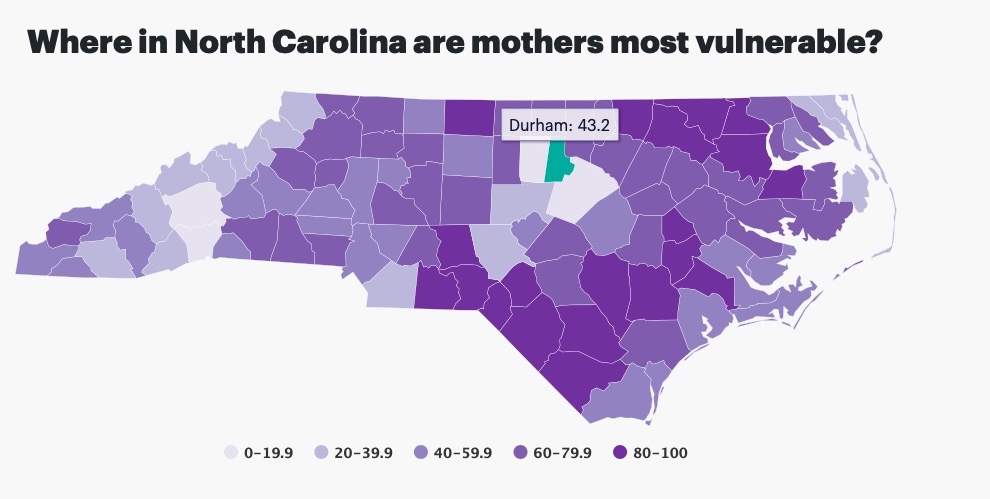The 2022 March of Dimes Yearly Report Card is out now. This yearly report presents the state of maternal and infant health in the United States. How did North Carolina and Durham county specifically rank on this year’s report card? North Carolina received a D for preterm birth rates. Durham County’s preterm birth grade was a C- (10.3% of live births were preterm, which has worsened since last year).
Every year, the March of Dimes releases its Report Card, tracking how states and counties are doing when it comes to preterm birth, infant mortality, and maternal health. This year’s report paints a complex picture for North Carolina — and for Durham, it’s one that shows both progress and persistent inequity.
Holding the Line on Preterm Birth
In 2023, North Carolina’s preterm birth rate was 10.7%, the same as the year before. That might not sound like progress, but in a time when maternal health outcomes are worsening nationwide, holding steady can be a quiet victory.
Durham County mirrored that state average at 10.7%, suggesting that while disparities persist, our local systems are helping prevent backsliding. Programs like Breastfeed Durham, ICO4MCH, and our local doula and lactation networks have created stronger safety nets for families through both hospital and community partnerships.
Still, preterm birth remains one of the greatest threats to infant health — and it’s not affecting all families equally.
- Black birthing people in North Carolina are 1.4 times more likely to experience preterm birth.
- Chronic conditions like hypertension and diabetes dramatically raise those risks.
- The data remind us that health equity isn’t just about care — it’s about time, access, and support before, during, and after birth.
Infant Mortality: A Story of Uneven Progress
North Carolina’s infant mortality rate rose slightly to 6.8 deaths per 1,000 live births, higher than the national average of 5.6.
But here in Durham, the rate stayed around 5.2 deaths per 1,000 — below both the state and national levels.
That’s good news, and it reflects years of coordinated work to improve maternal-infant care and access to lactation support. But within that progress lies a painful truth: Black infants in Durham are still more than twice as likely to die before their first birthday as White infants.
That statistic underscores the deep roots of racial inequity in healthcare access, social support, and economic stability. We can’t claim success until those gaps close.
Maternal Health and Vulnerability
The state’s maternal mortality rate rose to 26.7 deaths per 100,000 births, far above the national Healthy People 2030 goal of 15.7.
While North Carolina has made key policy moves — expanding Medicaid coverage to 12 months postpartum and launching Medicaid reimbursement for doulas — access alone isn’t enough if families can’t use those supports in time.
Durham ranks in the moderate-to-high range on the Maternal Vulnerability Index, driven by income inequality, high cost of living, and healthcare access disparities. The good news is that our community has built a collaborative response — from the Durham County Department of Public Health to grassroots advocates, doulas, and lactation consultants who fill the gaps.
Building the Systems Families Deserve
The March of Dimes report also grades states on the systems that shape outcomes — and North Carolina’s record is mixed:
- Medicaid expansion: Passed and active.
- Doula reimbursement: Implemented statewide.
- Paid family leave: Still not adopted.
- Midwifery policy: Limited progress toward autonomy and pay parity.
Durham’s coalitions — including Breastfeed Durham, Breastfeeding Family Friendly Communities, and the North Carolina Breastfeeding Coalition — are already doing the work the report calls for: aligning community voices, advancing policy, and making sure every family has the right to feed their baby safely, no matter the circumstance.
Looking Ahead
Durham’s steady numbers amid state and national turbulence are a sign that local, relationship-based systems change works.
Our challenge now is to deepen that work — to ensure that the zip code or skin color of a birthing person no longer determines their outcome.
The 2024 Report Card is a reminder that progress is possible, but only if we keep our focus local, build trust, and invest in community-driven care.
2019: The 2019 Report Card includes state-level grades for North Carolina. Durham had a C- WRAL.com+5PR Newswire+5

